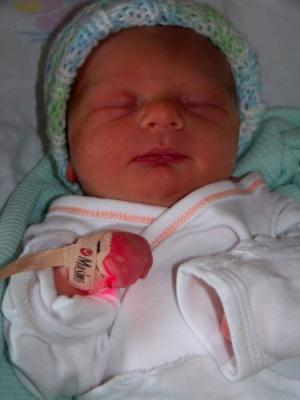
December 5, 2017 — Infant deaths from critical congenital heart disease (CCHD) decreased more than 33 percent in eight states that mandated screening for CCHD using a test called pulse oximetry. In addition, deaths from other or unspecified cardiac causes decreased by 21 percent, according to a recent study.
Pulse oximetry is a simple bedside test to determine the amount of oxygen in a baby’s blood and the baby’s pulse rate. Low levels of oxygen in the blood can be a sign of a CCHD.
CCHD screening nationwide could save at least 120 babies each year, according to the study published in the Journal of the American Medical Association. This study is the first look at the impact of state policies to either require or recommend screening of infants for CCHD at birth.
The study, Association of U.S. State Implementation of Newborn Screening Policies for Critical Congenital Heart Disease With Infant Cardiac Deaths, shows states that required their hospitals to screen newborns with pulse oximetry saw the most significant decrease in infant deaths compared with states without screening policies. Voluntary policies or mandated policies not yet implemented were not associated with reductions in infant death rates. The encouraging news is that 47 states and D.C. now have mandatory screening policies in place and one additional state, California, requires screening be offered. These results serve as a reminder to hospitals across the country to remain vigilant in their screening for CCHD.
“More families are able to celebrate special milestones in a child’s life thanks to the early identification and treatment of heart defects,” said CDC Director Brenda Fitzgerald, M.D. “Screening newborns for critical congenital heart disease in every state, tribe and territory will save lives and help babies thrive.”
About 1 in every 4 babies born with a congenital heart defect has CCHD and will need surgery or other procedures in the first year of life. In the United States, about 7,200 babies born each year have one of seven CCHDs. Without screening by a pulse oximetry reading, some babies born with a congenital heart defect can appear healthy at first and be sent home with their families before their heart defect is detected.
CDC works to identify causes of congenital heart defects, find opportunities to prevent them and improve the health of people living with these conditions.
For more information: www.cdc.gov


 November 12, 2025
November 12, 2025 









